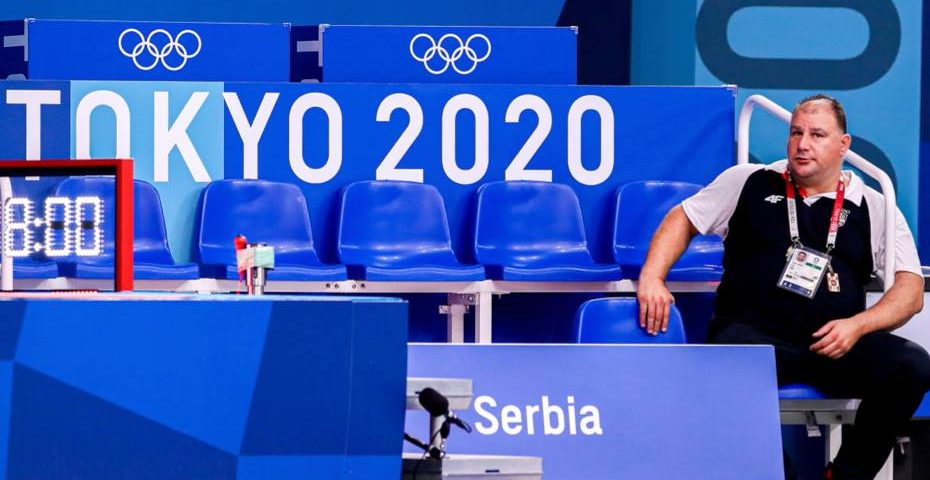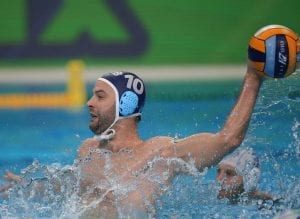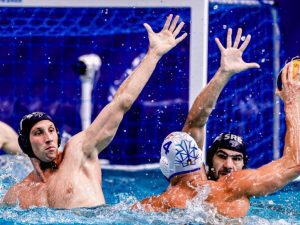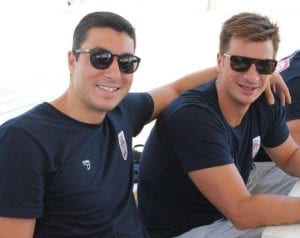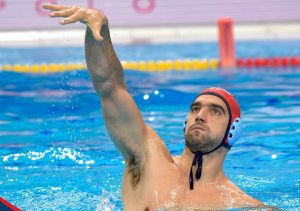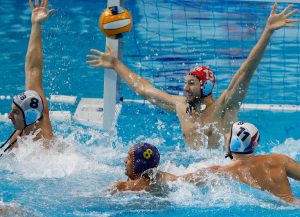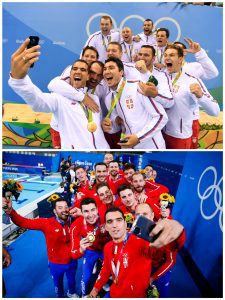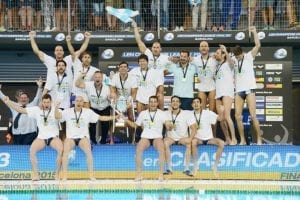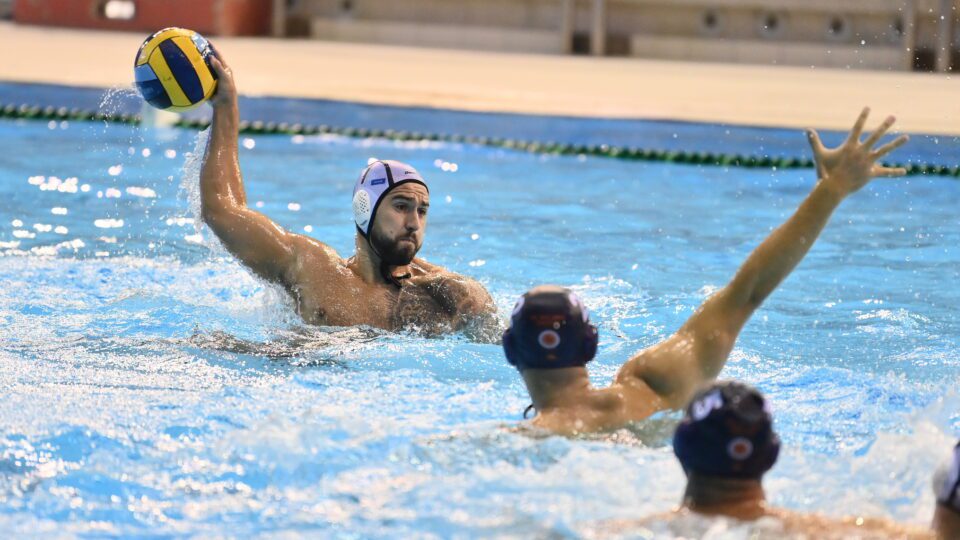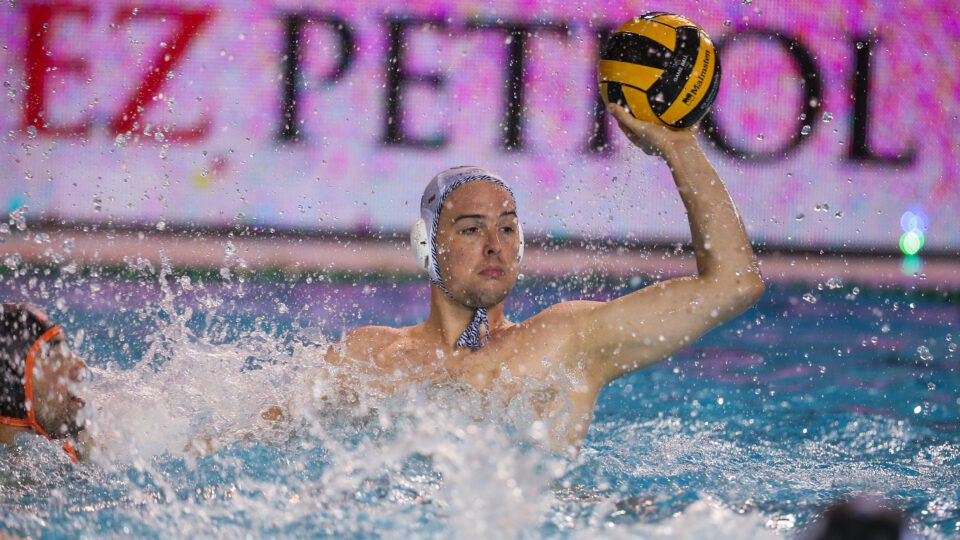Total Waterpolo doesn’t write about the history of cinematography. Of course, this isn’t an article about a famous 1954 Japanese movie “Seven Samurai”, directed by legendary Akira Kurosawa.
And, what is the connection between the title and the article?
This is an article about seven water polo legends, who finished their great careers in their national team in Japan, the homeland of the samurai. Besides, “Seven Samurai” is one of the longest movies in history, with a running time of 254 minutes. The career of each of the “seven water polo samurai’s” was also very long and lasted for years.
You guessed. The heroes of this story are Filip Filipovic, Andrija Prlainovic, Dusko Pijetlovic, Milan Aleksic, Gojko Pijetlovic, Stefan Mitrovic and Branislav Mitrovic. They retired from the Serbian national team after winning the Olympic title in Tokyo on Sunday.
Many would say that they were leaders of the best national team in the history of water polo. That is maybe true, maybe it isn’t. But, one thing is sure – they left a strong mark in the history of water polo. They wrote many golden pages of Serbian water polo. Serbia, with these seven players, dominated the world of water polo in the second decade of the 21st century. Their golden journey ended with the Olympic title won in Tokyo.
Beginnings of generation
The story about the golden generation starts in the middle of the first decade of this century.
Captain Filip Filipovic had the longest career in the national team of all the seven players. He debuted for Serbia and Montenegro at the age of 16. Filipovic was on the roster at the 2003 European Championship. He didn’t play a game at that tournament. SCG head coach Nenad Manojlovic awarded Filipovic with an invitation to the team for efforts during the preparations. Still, he was among 15 players who received the gold medal at the Championships held in Kranj. At that time, head coaches had the possibility to come to the LEN competitions with a 15-player roster and to select 13 before each game.
Filipovic, Dusko Pijetlovic, and Andrija Prlainovic won the World League with Serbia and Montenegro in 2005, but the golden generation started growing in 2006 after Serbia and Montenegro split up.
Serbia debuted on the international water polo stage as an independent country at the European Championship in Belgrade. Filip Filipovic, Dusko Pijetlovic, and Andrija Prlainovic were members of the team which won the title in Belgrade. They weren’t only members, but each gave a contribution to winning the gold medal.
Before the Championship, the team composed only of Serbian players won the World League, but they played as Serbia and Montenegro. The three of the “Seven Samurai” clinched that gold, too.
Turning point after Beijing Olympics
Dusko Pijetlovic, Andrija Prlainovic and FIlip Filipovic debuted at the Olympic Games in 2008. The bronze medal that Serbia reached in Beijing was a turning point. After the Beijing Olympics, several Serbian water polo legends, like Vladimir Vujasinovic,Dejan Savic, Denis Sefik, Aleksandar Ciric, Aleksandar Sapic, retired from the national team. Danilo Ikodinovic was forced to end his career due to injuries suffered in a traffic accident.
In the following year, the three “samurai” became the key players of a new Serbian national team, along with a little bit older Vanja Udovicic, Slobodan Nikic, Zivko Gocic, Slobodan Soro, etc.
After the mentioned departures, three new “samurai” – Gojko Pijetlovic, Stefan Mitrovic, Milan Aleksic -became regular members of the Serbian national team, coached by Dejan Udovicic. In the season 2008/2009, the three played for Partizan, s well as Filipovic, Prlainovic, and Pijetlovic. They were together throughout the clubs’ and the national teams’ seasons, which was one of the crucial factors in developing the new Serbian squad. Branislav Mitrovic also played for Partizan, but he still didn’t secure himself a spot in the national team.
The first big exam for the new generation was the 2009 World Championships in Rome. Many considered Serbia an underdog at that tournament since several legends left. But, after a bad start in the group stage, Serbia played better and better. They surprised many favorites and won the gold medal in Rome, beating Spain in a penalty shootout in the final. Interestingly, Serbia played with a shorter roster during almost the entire tournament. Stefan Mitrovic got ill after the first game. Because of that, Serbia had only 12 players in the remaining matches. That set of circumstances maybe helped them 12 years later. All teams had 12 available players for each game at the Tokyo Olympic tournament.
Next year, Serbia clinched the gold in the World League (as usual), and bronze at the European Championship. In 2011, after winning gold in the World League, the Serbs finished 2nd at the World Championships.
Step by step, the story about the “seven samurai” comes to a new Olympic year. In 2012, goalkeeper Branislav Mitrovic debuted for the national team. He played in the World League and the Mediterranean Games before, but his great debut at a major competition was the 2012 European Championships in Eindhoven. He waited for a long time to secure a place in the national team because the competition for the caps with numbers 1 and 13 in the Serbian team was strong. Before the 2012 ECH, Mitrovic replaced Gojko Pijetlovic, and with Filipovic, Dusko Pijetlovic, Prlainovic, Aleksic and Stefan Mitovic, won the European title in Eindhoven.
Serbia continued its row of Olympic medals with a bronze in London. Six of the seven samurai reached the third step of the podium in the capital of Great Britain. Gojko Pijetlovic returned to the team, while Branislav Mitrovic stayed home.
Failure in 2013 and start of domination
Slobodan Soro, a long-time first-pick Serbian goalie, retired from the national team after London. From that point, Gojko Pijetlovic and Branislav Mitrovic became the first two goalkeepers of the national team and were wearing caps with numbers 1 and 13.
From 2013, all seven samurai were together in the Serbian team, and they “swam” side by side at almost all major competitions in the next nine seasons.
Another important thing happened early in 2013. Dejan Savic became Serbia’s head coach.
The 2013 World Championships was the first big competition when all seven samurai were together in the team. Serbia finished 7th at the WCH held in Barcelona, which was quite disappointing. Savic failed to pass his first big test as a national team head coach, but he wasn’t dismissed. The Serbian Water Polo Federation gave him a new chance. It turned out that it was the right move.
Serbia won the European title at the 2014 continental championship in Budapest, defeating Hungary in the final. That was the start of Serbia’s domination. From 2014 to 2016, the Serbs won a gold medal at every major competition. They suffered just a few losses during these three years. The Olympic gold in Rio in 2016 came as a giant crown of a great generation. By winning the gold in Brazil, Serbia held titles in all water polo competitions simultaneously: Olympic Games, World Championship, European Championship, World Cup and World League.
From Rio to Tokyo
In the years that followed after Rio, Serbia kept on winning medals. It didn’t dominate as between 2014 and 2016. However, the Serbs defended the European title in 2018 (it was the 4th European gold in a row), they added several World League gold medals to the rich treasury, etc.
None of the samurai played at the 2019 World Championships, as Savic decided to give a chance to their successors. Serbia played with a rejuvenated team at the Worlds in Gwangju.
The seven heroes of this story regathered again for the 2020 European Championship, but Serbia failed to make the semifinals at this tournament. It didn’t qualify for the 2020 World League Super Final (held in 2021).
Consequently, the Serbs weren’t the heavy favorites for the title in Tokyo. When Savic announced the team, there were many different opinions regarding Serbia’s chances in Tokyo. Some said: “Serbia has a too old team. They can’t win a medal.” Still, it wasn’t an opinion of the majority. Serbia was considered as a medal contender at the probably most balanced and exciting Olympic water polo tournament in history.
Before leaving for Japan, Serbia’s players and coaches were saying more or less the same: “It isn’t crucial which place in the group we win. Our first goal is to make the quarterfinals.”
Indeed, they had the same recipe for the gold as in Rio in 2016. They had ups and downs in the group phase, and they showed their best in the most important games – in the knockout round. First, they demolished Italy in the quarterfinals. Then, they edged out Spain after a remarkable comeback in the epic battle in the semifinals and ended Spain’s winning streak in games against Serbia.
The last opponent was Greece, which played excellently in Tokyo. The Greeks proved that they had deserved a medal with their performance in the final game. But, the Serbs were stronger. The “Seven Samurai” said goodbye to the national team in the best possible way – with the gold medal at the most significant sports competition.
It was an emotional end of the seven great careers. Many of the seven left the pool of the Tatsumi Water Polo Centre in Tokyo in tears. Today, the “samurai” made Dejan Savic cry at the press conference in Belgrade, by singing a popular Serbian song “A sad Adio” (It’s time for a goodbye)
VIdeo source: YouTube/Sport Klub
During their long careers, they never refused an invitation to the national team, they were ready for all challenges, for long summer preparations, after exhausting seasons. They missed a few competitions in the past years. Still, these weren’t theirs, but coaches’ decisions. One of these competitions was the 2019 World Championships when Dejan Savic gave a rest for the most experienced players and gave a chance to their successors.
Dusan Mandic described the “Seven Samurai” excellently after the Olympic final:
“They were my older brothers, my fathers. I learned a lot from them during the ten years I played and trained with them. I learned from the best”.
Mandic, Jaksic, Rasovic, and other representatives of a new generation will have more responsibility in a rejuvenated team that will play from the next season.
But, the “Seven Samurai” still haven’t said their last words. They all play in quality clubs. In the following few seasons, they will have chances to add new trophies to their rich treasuries.
Seven biographies
Filip Filipovic
Born 1987.
Position: right wing
Clubs: Partizan, Pro Recco, Radnicki, Pro Recco, Szolnok, Olympiacos.
Medals with the national team: 34. Olympic medals: 2 gold (2016, 2020-1), 2 bronze (2008, 2012), World Championships: two gold (2009 and 2015), silver (2011), bronze (2017), European Championships: six gold (2003, 2006, 2012, 2014, 2016, 2018), silver (2008), bronze (2010).
Andrija Prlainovic
Born: 1987
Position: left wing.
Clubs: Jadran HN, Partizan, Pro Recco, Crvena Zvezda, Pro Recco, Szolnok, OSC, Marseille.
Medals with the national team: 30. Olympic medals: 2 gold (2016, 2020-1), 2 bronze (2008, 2012), World Championships: two fold (2009 and 2015), silver (2011), bronze (2017), European Championships: five gold (2006, 2012, 2014, 2016, 2018), silver (2008), bronze (2010).
Dusko Pijetlovic
Born 1985
Position: centre-forward
Clubs: Vojvodina, Partizan, Pro Recco, Crvena Zvezda, Sintez, Pro Recco, Dynamo M, Szolnok, Novi Beograd
Medals with the national team: 31. Olympic medals: 2 gold (2016, 2020-1), 2 bronze (2008, 2012), World Championships: two gold (2009 and 2015), silver (2011), bronze (2017), European Championships: five gold (2006, 2012, 2014, 2016, 2018), silver (2008), bronze (2010).
Milan Aleksic
Born: 1987
Clubs: Partizan, Szolnok, Barceloneta, Partizan
Medals with the national team: 24. Olympic medals: 2 gold (2016, 2020-1), 1 bronze (2012), World Championships: two gold (2009 and 2015), silver (2011), bronze (2017), European Championships: four gold (2012, 2014, 2016, 2018), bronze (2010).
Stefan Mitrovic
Born 1988
Position: left wing
Clubs: Partizan,Szolnok, Ferencvaros, Olympiacos, Apollon, Partizan
Medals with the national team: 25. Olympic medals: 2 gold (2016, 2020-1), 1 bronze (2012), World Championships: two gold (2009 and 2015), silver (2011), bronze (2017), European Championships: four gold (2012, 2014, 2016, 2018), bronze (2010).
Gojko Pijetlovic
Born: 1983.
Position goalkeeper
Clubs: Vojvodina, Partizan, Cattaro, Budva, Crvena Zvezda,Ferencvaros, Oradea, Sabac, Oradea, Novi Beograd.
Medals with the national team: 24. Olympic medals: 2 gold (2016, 2020-1), 1 bronze (2012), World Championships: two gold (2009 and 2015), silver (2011), bronze (2017), European Championships: four gold (2012, 2014, 2016, 2018), bronze (2010).
Branislav Mitrovic
Born 1985
Position: goalkeeper
Clubs: Vojvodina,Partizan, Ferencvaros, Debrecen, Eger, OSC, Vasas.
Medals with the national team: 16. Olympic medals: 2 gold (2016, 2020-1), World Championships: gold ( 2015), bronze (2017), European Championships: four gold (2012, 2014, 2016, 2018)
Trophies with clubs, individual awards
It’s hard to count all the trophies the seven heroes of this story have won with their clubs. But, let’s select the most valuable.
Andrija Prlainovic and Dusko Pijetlovic are the only players in the history of water polo who won three titles in the Champions League in a row with three different clubs – 2011 (Partizan), 2012 (Pro Recco), and 2013 (Crvena Zvezda). They both won the 2015 Champions League (with Pro Recco), while Prlainovic lifted the Champions League trophy with Szolnok, too – in 2017.
Besides Prlainovic and Pijetlovic, Aleksic and Stefan Mitrovic won the Champions League with Partizan. Aleksic won the 2017 Champions League with Szolnok, while Stefan Mitrovic did the same with Ferencvaros in 2019.
Filip Filipovic clinched three Champions League playing for Pro Recco (2010, 2012, 2015).
Almost ech of the seven has won the LEN Euro Cup. Filipovic has two trophies (2013 with Radnicki and 2021 with Szolnok), Gojko Pijetlovic one with Cattaro (2010), Stefan Mitrovic two with Ferencvaros (2017 and 2018), Dusko Pijetlovic one with Szolnok (2021).
They have won a number of individual awards. They were voted the MVP of many competitions, they were picked to “All-star” teams a number of times… Filipovic was voted the best player of the World and Europe a few times. He and Prlainovic received awards for the best Serbian athlete of the year…
None of the “samurai” still has won the Total Player Award. But, this award was launched in 2017, but between 2017 and 2020, Serbia wasn’t so dominant. Still, they were highly ranked in the voting for the previous Total Player award, when our expert jury picked the best players of the 21st century.
We’ll see if some of the samurai will win the Total Player Award this year. The experts will decide.



